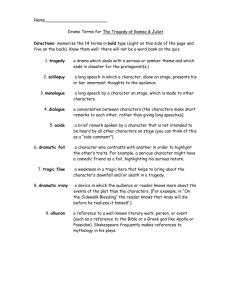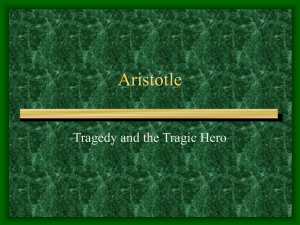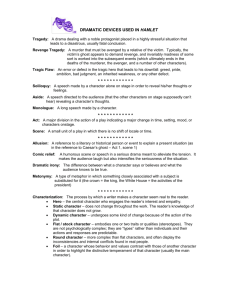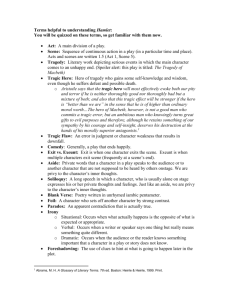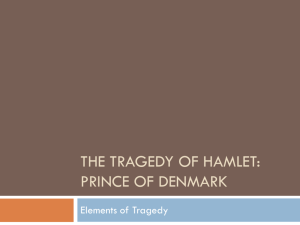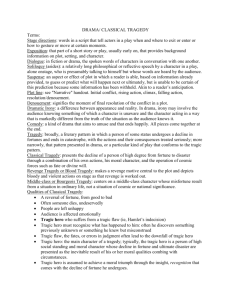Document 10464509
advertisement
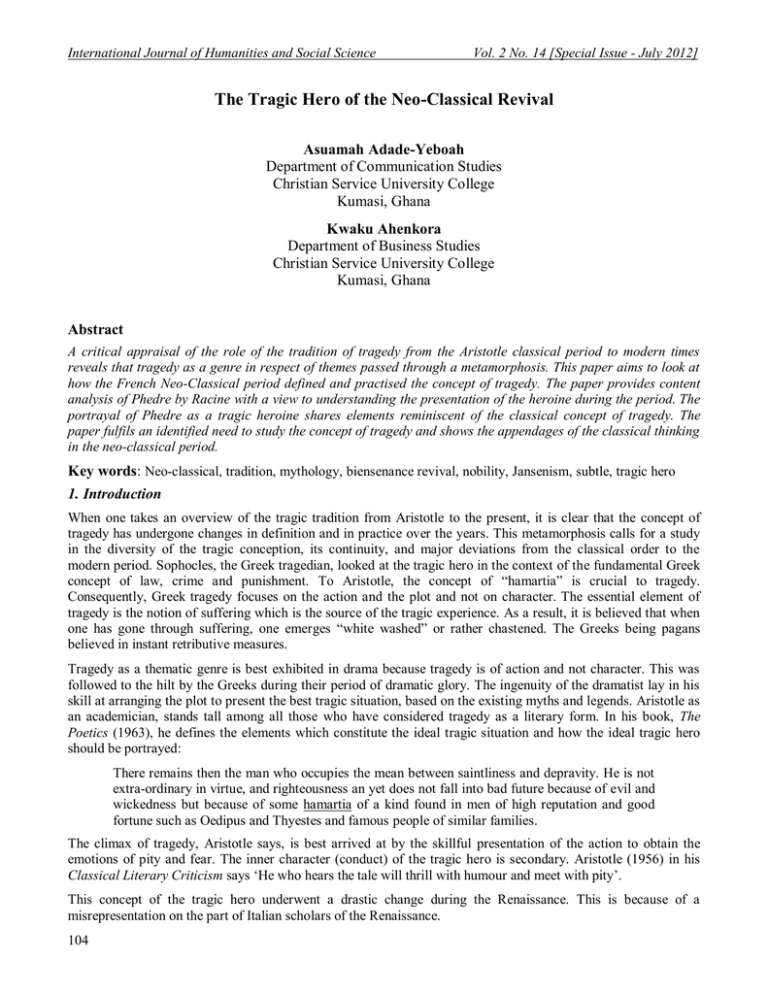
International Journal of Humanities and Social Science Vol. 2 No. 14 [Special Issue - July 2012] The Tragic Hero of the Neo-Classical Revival Asuamah Adade-Yeboah Department of Communication Studies Christian Service University College Kumasi, Ghana Kwaku Ahenkora Department of Business Studies Christian Service University College Kumasi, Ghana Abstract A critical appraisal of the role of the tradition of tragedy from the Aristotle classical period to modern times reveals that tragedy as a genre in respect of themes passed through a metamorphosis. This paper aims to look at how the French Neo-Classical period defined and practised the concept of tragedy. The paper provides content analysis of Phedre by Racine with a view to understanding the presentation of the heroine during the period. The portrayal of Phedre as a tragic heroine shares elements reminiscent of the classical concept of tragedy. The paper fulfils an identified need to study the concept of tragedy and shows the appendages of the classical thinking in the neo-classical period. Key words: Neo-classical, tradition, mythology, biensenance revival, nobility, Jansenism, subtle, tragic hero 1. Introduction When one takes an overview of the tragic tradition from Aristotle to the present, it is clear that the concept of tragedy has undergone changes in definition and in practice over the years. This metamorphosis calls for a study in the diversity of the tragic conception, its continuity, and major deviations from the classical order to the modern period. Sophocles, the Greek tragedian, looked at the tragic hero in the context of the fundamental Greek concept of law, crime and punishment. To Aristotle, the concept of “hamartia” is crucial to tragedy. Consequently, Greek tragedy focuses on the action and the plot and not on character. The essential element of tragedy is the notion of suffering which is the source of the tragic experience. As a result, it is believed that when one has gone through suffering, one emerges “white washed” or rather chastened. The Greeks being pagans believed in instant retributive measures. Tragedy as a thematic genre is best exhibited in drama because tragedy is of action and not character. This was followed to the hilt by the Greeks during their period of dramatic glory. The ingenuity of the dramatist lay in his skill at arranging the plot to present the best tragic situation, based on the existing myths and legends. Aristotle as an academician, stands tall among all those who have considered tragedy as a literary form. In his book, The Poetics (1963), he defines the elements which constitute the ideal tragic situation and how the ideal tragic hero should be portrayed: There remains then the man who occupies the mean between saintliness and depravity. He is not extra-ordinary in virtue, and righteousness an yet does not fall into bad future because of evil and wickedness but because of some hamartia of a kind found in men of high reputation and good fortune such as Oedipus and Thyestes and famous people of similar families. The climax of tragedy, Aristotle says, is best arrived at by the skillful presentation of the action to obtain the emotions of pity and fear. The inner character (conduct) of the tragic hero is secondary. Aristotle (1956) in his Classical Literary Criticism says „He who hears the tale will thrill with humour and meet with pity‟. This concept of the tragic hero underwent a drastic change during the Renaissance. This is because of a misrepresentation on the part of Italian scholars of the Renaissance. 104 The Special Issue on Social Science Research © Centre for Promoting Ideas, USA www.ijhssnet.com This period represents a rejection of the classical period. The Renaissance critics propounded the moral doctrine, and insisted on the reading of the tragic flow theory. The concept of tragedy was influenced by tenets of the Christian religion which introduced beliefs in original sin and man‟s innate corruption. It was, therefore, easy to believe that man‟s wickedness was inherent in his character. The reason for this change in conception can be traced to the use of the word “hamartia” in the Greek Bible. This word was translated from “a going wrong” to “a weakness of character” by the Renaissance critics. As a result, Marlowe‟s emergence as a playwright in Dr. Faustus reinforced the notion that, when a fall comes the way of a hero it is because of his willful indulgence, his lustful desires and his incapacity to repent. Hubris, therefore proved to be the sin of Dr. Faustus who became responsible for his own downfall. This is equally the fate of King Lear, Coriolanus, Macbeth and Othello – Shakespeare‟s tragic heroes. Apart from the received tradition coupled with the Christian dimension, the characterization of the English tragic hero was further influenced by Machiavelli through the publication of The Prince (1560). This influence accounts for the blossoming of Machiavellian figures such as Edmund in King Lear and Richard III. It is clear that the concept of tragedy and its practices have gone through metamorphosis. Therefore, the aim of this research is to provide perspectives on the tragic hero of the Neo-classical revival. 2. Approach The study opted for the use of content analysis of Phedre. The use of textual analysis has been advocated for in Shakespearian drama studies (Termizi & Ching, 2012). Brown (1990) provides Beckerman‟ view on reading theatrical works to show that where the theatre student will read (the plays) for situation, for stage business, for audience response, the literature student will read for symbolic significance, for thematic strands, for intellectual nuance. Beckerman clearly suggests two types of reading. There is no doubt that both readings have their advantages. This paper uses textual analysis. This choice of approach is linked with McCaw‟s (2008) view that close reading has been a recent approach in literary criticism where a critical analysis of texts gives room to an internalised literary devices of the individual. Atkins (1993) reinforces this view when he indicated that almost every literary work is attended by a host of outside circumstances which, once we expose and explore them, suffuse it with additional meaning. This paper, therefore, takes the content analysis approach and provides explorations of the concept of tragedy by close reading. By so doing, it corroborates Leavis‟ (as cited in McCaw, 2008) belief that the close reading approach brings positive influences to scholars by enabling them to view “the ways in which texts upheld moral issues and codes of behavior [and] „teach‟ readers about life and human nature‟. Results and discussions The Neo-classical practice immediately followed the English Renaissance. One of the early practitioners was Corneille who was influenced by the Renaissance period. He created in his work, an ideal world full of heroes and illustrious men. This character is out of the ordinary by birth and rank. With Corneille‟s tragedies, the plays take the form of a problem and keeps alive the curiosity of the audience until the last act. The dilemmas of Cornelian character tear them apart. For example, in his book Le cid Chimene is torn between love for Rodrigue and causing his murder. Similarly, Rodrigue is torn between killing a lover‟s father and love for Chimene. His concept of tragedy is based on free will which is a concept borrowed from the humanist tradition. The tragic element in Corneille‟s play is not the pathetic helplessness of the hero but the circumstance in which wicked fate has placed him. Corneille‟s theatre, therefore, in the literal sense of the phrase, is “a school of moral greatness”. Corneille clearly admires the sublime and loves restlessness. That is why he makes Horace murder his sisters and Rodrique slays his lover‟s father. He realizes that tragedy must represent evil more than good. However for the purpose of the title “Neo-classical Revival”, my focus is on Racine whose world views are diametrically opposed to Corneille‟s. The play Phedre by Racine with its tragic heroine, Phedre is used in presenting the neo-classical metamorphosis of the tragic hero. As a neo-classical revivalist, in the preface to Berenice, Racine portrays that; “It is irrelevant that there should be blood and dead people in a tragedy, the most important thing is that it must be grand and that the actions must be heroic … The only thing that matters in tragedy is resemblance… The paramount rule is to give pleasure and to move” This credo of Racine‟s, sums up all his dramatic inclinations. He believes in nobility both of action and of thinking. He does not deviate from Horace‟s concept of appropriateness of the characters - bienseance. 105 International Journal of Humanities and Social Science Vol. 2 No. 14 [Special Issue - July 2012] This concept presupposes that, king as a character should behave as king. In his attempt to revive the classical order, Racine draws his characters from Greek methodology and remains faithful to the model. The Racinian tragedy is thus a useless and helpless fight of man against his destiny, as clearly demonstrated by Sophocles in King Oedipus. Tragic heroines/heroes like Andromague, Iphigenia and Phedre are all drawn from Euripides, Virgil and Seneca respectively who are all ancient writers. It is clear that Racine seems to bring French tragedy nearer to what has come to be recognized as the heart of tragedy. Thus Moore (1971) quotes the words of Manlier in sharing Racine‟s opinion: It is in Iphigene that the Racinian concept of Fate takes its true shape, That Racine recovers the possibility of using destiny as force … With Iphigene and Phedre, returns to real tragedy the fatality of Dionysian myth. Once again, by keeping to tradition, Racine achieves a revolution, and revives on the French stage the idea of man‟s unchanging fate. For this reason, Racine prides himself that he does not invent characters. The concept of Racine‟s religious movement holds the view that man, being the fruit of the sin committed by Adam and Eve is incapable of redeeming himself through the handwork except by an act of grace. In his work, French neo – classicism seems to reach its ultimate dramatic achievement s which allows us to view human condition as being in itself tragic. Phedre, the heroine, is herself torn asunder by a natural sense of right. Since the notion of duty and the power to love are both natural, there is no split in human nature as we know it. Hence in the play Phedre, we see a tragic heroine who is unable to alienate herself from incestuous act. This guilty passion is evident in her speech to Hippolyte: My husband is alive and I am still in love, With whom? Whose is the heart of my desires are set on? Every word makes my hair stand on end. (L.1266-8) Hence Racine‟s Phedre is a play of passionate love. Much like its classical precursors, this passion of love becomes almost like a disease but in the case of the neo-classical period, this “I„amour passion” is metaphorically presented and thus becomes the controlling symbol of the entire tragedy. The heroine is thus spiritually and physically tormented, and the efforts she makes to overcome her inner conflict constitute the spring board of Phedre‟s tragic conflict. She is fully aware of her position as a queen and as a step mother, yet she becomes jealous of Aricie, Hippolyte‟s girlfriend”. “Aricie has found the way to his heart (L.1223) Racine does not ask us to admire his heroine; he begs only for our pity. Pheche is an ordinary heroine by excites our pity, especially where she says; My crimes now have gone beyond all bounds Now I am plunged in both incest and deceit, My murderous hands, eager to avenge me long to battle in innocent bond”(L.1269-1272) From the above, one realizes that Phedre is at a metaphysical level of her struggle between feeling and reason which raises the tragic action to conflict between the heroines‟ consciousness and the world of rational plan. The speech clearly exonerates Phedre from being evil. Her self analysis which can transcend this speech attracts our pity because she is like one of us. Racine‟s heroine clearly demonstrates a sense of remorse. Hence Phedre confesses how she wrestles with herself to offset this passion of love for a step son, so she can restore her dignity. The request of this is an overwhelming sense of remorse and terror: Oh pain never fact before! For what new, torture have I kept myself alive all All I have suffered, my fears, my violent emotions the funny of my passion, the of my remorse And the intolerable insult of a rejection All this was but a weak foretaste of the torture I am ending. (L.1225-1230) 106 The Special Issue on Social Science Research © Centre for Promoting Ideas, USA www.ijhssnet.com This passion replaces the Cornelian stronger will, a sequel to the Greek notion of fatality. Fatality in Racine‟s tragedy is determined by hereditary, the gods and the triumph of the subconscious mind. For example, Phedre loves, in spite of herself, being the victim of the gods as Phedre herself observes in her rhetorical remark. “…which heart is the beneficiary to my wishes human beings tries in the hands of wonton god” (L.667-679) Phedre‟s feeling of subjugation to forces beyond for control becomes her bitter complaint against the gods Racine effects deft transition from her complaint against persecution by the gods to her expression of helplessness to resist Hippolyte‟s charms when in his presence she remarks: Fearing for a son who I dared not betray I wanted to beg you not to hate – such was the Feeble plan of heart too full of what it loves” (L.692-695) Phedre reaches the depth of that self – loathing and self-rejection which will determine her death in the final scene of the play. Racine‟s Classicism becomes a personal triumph of his innate Romanticism. Unlike Corneille, there is little or no action in his play and therefore Phedre does a lot of mental analysis of situations. Phedre‟s tragedy is therefore based on the relationship between him and her destiny. When this element of destiny and her passion are blended, the result is fatal- Hence, Phedre gets mad, much like Oedipus who blinds himself. Racine makes another attempt to revive the classical order in his presentation of the tragic heroine. Like the classical hero, Phedre faces an intolerable and sometimes agonizing situation in which he is trapped and from which she can free herself only by shouldering her responsibility as a heroine. In the humanist world of Racine‟s heroine, therefore, it would seem that nothing- misfortune, suffering or catastrophe- can undermine her overwhelming integrity. Fortified by energy and stoicism, the neo-classical French tragic heroine like Phedre, much like the classical counterparts, have nothing to fear at the hands of destiny. Like Oedipus, Phedre will parry the blows of destiny, or bear them uncomplainingly. Fate may dog their steps; to her it is nothing but external accidents and mishaps that are powerless to force an entry in her heart and alter her resolve. As a neo-classical revivalist, Racine believes in the sin of retribution. This, he emphasizes in his drama. For example the hero, Nero, suffers because his father Agrippinne was a criminal. Similarly, Phedre suffers because her mother Minos was a judge over the dead in hell. The hands of the gods as in the classical times recur in the neo- classical period. In the humanist world of Racine‟s heroes/heroines, it would seem that nothing-misfortune, suffering or catastrophe can undermine them over weaning integrity. Phedre, much like her classical counterparts, have nothing to fear at the hands of Destiny, or bear them uncomplainingly. Fate may dog steps, but to them it is nothing but a congeries of external accidents and mishaps, and it is powerless to force an entry into her heart and alter their resolve. The Racinian heroes know suffering which is sometimes expressed as in Phedre‟s lyrical stanzas and his monologues. Chimene confesses that Rodrigue “tears her heart to pieces”, and Pauline recognizes that her duty “tears her soul” . Phedre‟s jealousy is seen when Thesee casually mentions that Hipployte has confessed his love for Aricie. Lustful, jealous, self-deceiving and conscience – stricken, exhausted and bewildered by her own conflicting emotions and the twists and turns of fate, Phedre is truly the “weak moral” who is guilty of her own passion, deserves our pity. This is the tragic situation which surrounds the heroine. She does not choose to lust after Hippolyte. Her passion is inflicted on her by a goddess. A more tragic instance of irony (closer to the ancient notion of “tragic irony”) where the character lacks the knowledge possessed by another character and the audience is portrayed by Phedre when she exhibits her innocence and idyllic love to each other. Like the Oedipus myth, the story of Phedre involves sacrilege and the perversion of the relationship between mother and son. It is indeed, a story of erotic love, the overwhelming passion of love in a woman. Racine‟s tragic emotions and what cleanses them are evident in the concept of predestination. To this effect, Racine‟s heroine is made to be obsessed with her guilt and her inward sense of remorse. Racine‟s handling of his plot-structure as a neo-classical revivalist is much like his classical precursors. According to Racine, Phedre is the first to feel horror at her illicit passion. She makes every effort to overcome it. She prefers to die rather than to confess it to anyone. When she is forced to reveal it, she speaks of it with shame which makes it very obvious that her crime is rather a punishment by the gods than movement of will. There seems to be two moral codes in operation here: the code of Minos, Phedre‟s father and the code of Phedre herself. Racine‟s Phedre therefore appears as innocent as possible. 107 International Journal of Humanities and Social Science Vol. 2 No. 14 [Special Issue - July 2012] The analogous concern of Euripides as one of the ancient tragedians is crucial here. He seeks to show the cruelty, the irrationality, the contradictions of the gods or of the forces that work upon human beings and the tragedy which results. Conclusion Phedre as a play fits into the use of myths once more to present at a deep level, the effects of passion and the nature of suffering. Racine‟s handling of his plot-structure as a neo-classical revivalist is much like his classical precursors. Phedre is a reasonable character but in describing her suffering, she has reached the limit of lucidity as to what can reasonably be said about the human condition. In this study of the neo-classical period, the portrayal of Phedre as a tragic heroine shares elements in common with the classical concept of tragedy. References Aristotle. (1963). The Poetics. London: J.M. Dent and Sons Ltd. Atkins, D.G. (1983). Reading Deconstruction: Deconstructive Reading. Lexington: University Press of Kentucky Brown, J.R. (Ed) (1990) Studying Shakespeare: A Casebook. London:Macmillan Education Ltd Hegel. (1962). Hegel Tragedy. New York: Anchor Press McCaw, N. (2008). How to Read Texts: A Student Guide to Critical Approaches and Skills: London:Continuum Moore, W.G. (1971). The Classical Drama of France. London: Oxford University Press Paohicci, A. (1962). Tragedy. New York: Anchor Press Racine. (1677). Phedre Sackey, A. A. (1992). The Dimensions of Comparative Literature. Accra: Superior Media Associates. Sophocles. (1974). The Theban Plays. Harmondsworth: Penguin Books Ltd. 108
